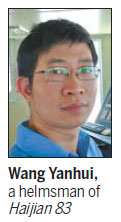 |
|
|
|
|||||||||||
Editor's note: China Marine Surveillance has increased its patrols in Chinese territorial waters in recent years. A China Daily reporter joined the third patrol to the South China Sea this year, from March 5 to 20, to get a taste of life on board.
The ship is swaying from side to side so violently that everyone in the pilot's cabin has to catch hold of handrails or sit tightly on chairs that are fixed to the floor, to avoid falling.
 |
|
An illegal oil rig spotted in Chinese territorial waters during the China Marine Surveillance Force's third patrol this year on the South China Sea, at sunset. Photos by Wang Xiaodong / China Daily |
Seen from the window, the boundless sea seems to slope when the ship descends to the trough of a wave, tossing the ship up and down and making people feel nauseated, as if they were in a malfunctioning elevator that is rising and falling constantly.
To the occasional passenger, the jostling may seem like something out of a nightmare. But to the young pilot of the ship, who is still in his 20s, these are simply the conditions in which he works. And they have been worse.
"This is not a real storm," said Wang Yanhui, 29, who has served as one of the helmsmen of Haijian 83 of the China Maritime Surveillance Force for four years.
"I have seen storms that tossed the ship six meters up and tilted it 30 degrees, when everything in the room that is not fixed down slips and falls and everybody reaches for the buckets to throw up in."
Like other surveillance vessels operated by the South China Sea branch of the country's oceanic administration, the ship sails the seas periodically to investigate reports of illegal fishing or oil exploration in Chinese waters, as well as other violations.

For Wang, piloting a ship in the force charged with enforcing China's maritime laws came as the fulfillment of a childhood dream.
A native of Central China's Henan province, Wang grew up eager to know what the sea looked like. Interested in the military and hoping to join the army, he applied to attend a navy college after graduating from senior high school.
"Unfortunately, I failed an eyesight test and wasn't accepted by that college," he recalled, pointing to his glasses. "So I chose to major in sea navigation at another college."
At school, he saw the sea for the first time, a sight that proved to be a disappointment.
"I always pictured the sea as being crystal blue," he recalled. "I did not expect the coastal sea to be yellowish."
Before graduation, Wang passed a test given by the State Oceanic Administration and was assigned to a ship. He had to take an internship for a year, pass strict exams and get a license. Only then could he get behind the helm of the 3,000-ton surveillance vessel.
Yet even when dreams do come true, they often are not as sweet as a person had imagined. Wang found life at sea not to be as romantic as he had envisioned. The initial excitement of sailing on vast blue waters and enjoying the sight of a rosy sea surface at sunset quickly faded and was replaced by formidable difficulties.
"Life is quite boring at sea," Wang said.
"For months in the deep ocean, all you can see is boundless water, except for the oil rigs or fishing boats that occasionally appear."
Seasickness, as it is for many other seamen, was the first obstacle Wang had to suffer when he began his life at sea. He recalled that a storm had come upon his ship during his first trip into the South China Sea. Being tossed about on board made him so sick that he couldn't eat anything without throwing up and was reduced to lying in bed for three days.
"I had a piece of watermelon on the fourth day but threw it up immediately," he recalled.
Later Wang, like other crewmen aboard the ship, gradually got used to life at sea and came to tolerate the seasickness.
"Even the most seasoned seamen would vomit when the storm gets nasty," Wang said. "But it's no big deal at all. For us, vomiting is something as common as having meals."
Luckily for him, the ship he now pilots is equipped with the latest equipment. That, added to the knowledge and experience he gained at college, means that steering the ship does not place particularly heavy demands on him.
The ship is guided by a precision electronics system, and Wang only has to steer by hand when the ship comes too close to another or when it is entering a harbor.
Technology has made life far less arduous for Wang and his dozens of shipmates. They can eat fruit every day, live in air-conditioned rooms and even watch satellite TV programs.
Wang works two shifts every day - from 8 am to noon and from 8 pm to midnight. When he has nothing to do, he can play table tennis and computer games.
Despite the onboard entertainment, Wang can still feel low in spirits when at sea. His job calls on him to embark at least 10 times every year, causing him to be away from his family about 200 days in a year.
"Mobile and Wi-Fi signals vanish as soon as the ship sails into public waters," he said. "I miss my wife and 2-year-old baby all the time and the only thing I can do is to look at their pictures."
Wang said that every time one of his short reunions with his family comes to an end and he must prepare for another voyage, he always finds it hard to say goodbye.
"I sometimes even wish there was something wrong with the schedule so I could stay at home for one more day," he said.
Speaking of his job, Wang said he has mixed feelings toward it.
"This work is hard, to tell you the truth," he said. "But it's important to safeguard the oceanic interests of our nation, and someone has to do this work."
Although China's maritime surveillance force, like Wang, has accomplished much and made many sacrifices, it still remains mysterious and largely unknown to the public. Wang said that bothers him very little.
"I don't care whether our work is recognized or not," he said. "I am proud of dong this job. We have accomplished many concrete things for our country. As long as I am needed, I will continue to serve."

|

|

|

|

|

|